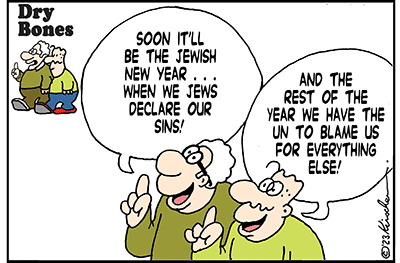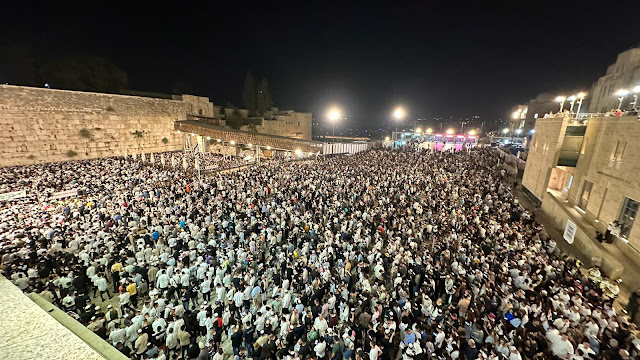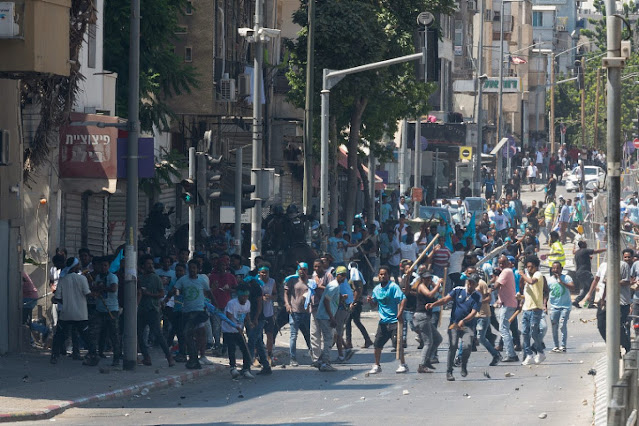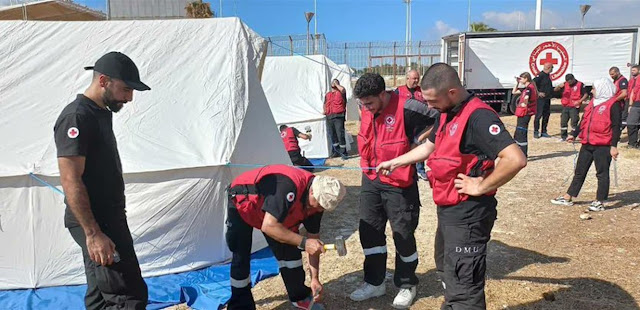By Daled Amos
Amid increased Palestinian terrorist attacks on Israeli civilians and reports of Arab-on-Arab clashes, Israelis now face another source of violence.
A week ago, there were confrontations within the Eritrean community in Tel Aviv:
Hundreds of Eritrean government supporters and opponents clashed with each other and with Israeli police Saturday, leaving dozens injured in one of the most violent street confrontations among African asylum seekers and migrants in Tel Aviv in recent memory.
Among those hurt were 30 police officers and three protesters hit by police fire.
Eritreans from both sides faced off with construction lumber, pieces of metal, rocks and at least one axe, tearing through a neighborhood of south Tel Aviv where many asylum seekers live. Protesters smashed shop windows and police cars, and blood spatter was seen on sidewalks. One government supporter was lying in a puddle of blood in a children’s playground. [emphasis added]
This is not something new. Back in June 2018 :
A violent confrontation between infiltrators from Eritrea broke out this afternoon in the south Tel Aviv old bus station compound.
...In the past few days, videos of brutal fights have been circulated on social networks as part of a civil war between supporters of the regime in Eritrea and its opponents [emphasis added].
According to one estimate, Eritreans make up about 18,000 of the over 30,000 Africans seeking asylum in Israel. Most arrived in the country illegally years ago when they crossed over via the Sinai, claiming they faced persecution and compulsory conscription. The majority are Christian and many are Muslim.
It is an immigration problem reminiscent -- though not identical -- to the problem France faces with its Muslim immigrants. The violence in France is not a clash among the immigrants themselves. They like the economic opportunities available in France while at the same time resisting attempts to integrate them into French society and Western values. Legal Insurrection goes even further, noting that "such occurrences are commonplace in European countries with large African and Middle Eastern populations, such as France, Germany, and Italy." These governments find that deporting these immigrants is not an option.
But that is exactly the option that Netanyahu wants to use. He held a special meeting to explore options on how to deal with the riots and emphasized the nature of the violence:
We are seeking strong steps against the rioters, including the immediate expulsion of those who took part. It is hard for me to understand why we would have a problem with those who declare that they support the regime; they certainly cannot claim refugee status.
I would also like this forum to prepare a complete and updated plan to repatriate all of the remaining illegal infiltrators from the State of Israel; this is the purpose of our meeting today. [emphasis added]
The very nature of the riots undercuts the reason for their presence in the country. Those who participated in the riots in support of the Eritrean government cannot at the same time claim the right of asylum. And if the reason they are in Israel is to seek financial opportunity, the threat they pose to the country justifies their ouster.
In 2018, Naftali Bennett made the same point:
“Would refugees escaping the regime’s horrors attend a party of that regime? People, these are illegal immigrants, not refugees,” Bennett wrote about a picture showing hundreds of Eritreans attending an earlier cultural event organized by their country’s embassy in Israel.
And a year before that, Netanyahu was already saying Eritreans were not refugees: "They aren’t refugees. Or at least most of them aren’t. Most of them are looking for jobs."
But the article makes another point that is especially relevant considering the current mood in the country:
Government and Knesset efforts to force migrants out have been repeatedly struck down or limited by the High Court of Justice, which has said a solution in line with international norms must be found.
And this is setting the stage for another volley in the fight for judicial reform. Arlene Kushner writes:
There were plans to move the infiltrators out back in 2018. But what the Knesset had laid out, the High Court overturned. Now there is determination to move beyond this stalemate:
Finance Minister Bezalel Smotrich (RZ) declared:
“In the Saturday riots, which were only the promo for what awaits us if we do not return the infiltrators to their countries of origin, there is only one responsible: the High Court. For years we have been warning, for years the High Court has prevented any action that would allow the infiltrators to be returned to their homes. That is precisely why we are leading the reforms in the judicial system that will allow elected officials to make decisions and carry them out for the citizens of Israel, their safety and security.” [emphasis added]
It all circles around and should be duly noted here. Interference of the Court in Knesset decisions is part of the story. Inappropriate Court interference is THE key issue of the day.
“I am about to propose a bill to eliminate illegal migrants. The proposal will include a clause against High Court intervention,” said Likud MK Boaz Bismuth.
Kushner concludes:
As attempts to move out the illegals proceeds, I anticipate a furor from various countries and agencies declaring that Israel is a heartless nation denying innocent refugees their rights. That would be about par for the course.
And sure enough:
the United Nations cautioned Israel against mass deportations of Eritreans following the riots, saying it would “contravene international law.”
“UNHCR calls for calm and restraint, and on all parties to refrain from taking any steps that could aggravate the situation further,” William Spindler, spokesman for the U.N. high commissioner for refugees, told reporters in Geneva on Tuesday.
Spindler said that it was “important to establish accountability” for the event but warned that “any decision impacting all Eritrean asylum-seekers … would contravene international law.”
In other words, the concern for Israel's ability to continue as a democracy and a Jewish state can be used to justify the creation of a Palestinian state regardless of its antagonism towards Israel, but when it comes to illegal immigrants -- many of whom openly identify with the current Eritrean government -- Israel is told it is responsible for them.


 Elder of Ziyon
Elder of Ziyon













































